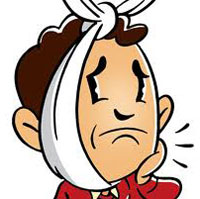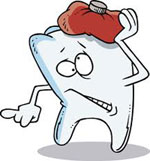EMERGENCIES can occur at the most inappropriate of times. It is the weekend; you are attending an important event, and your bridge falls out. You are in the middle of eating dinner; a tooth breaks off a denture when you take a bite.
It is midnight; it has been four hours since your tooth was extracted, and it still would not stop bleeding. You are sound asleep in the middle of the night; a severe toothache awakes you. And the list can go on and on.
Today, I will look at some First Aid Measures.
1. Abscesses: If an abscess has a pimple-like swelling at the tip, rinsing with warm salt water will cause it to form a head, which will eventually release pus. This also applies if the abscess is on the face. Over-the-counter ointments and Aloe Vera gel may help relieve symptoms such as pain and burning. Do not use over-the-counter steroid ointments, since these may cause infections to spread.
2. Bitten tongue or cheek, or cuts inside the mouth: Bleeding can be stopped by applying pressure to the area with gauze and ice. Avoid using numbing ointments on the tongue, or you may accidentally bite it again.
3. Bleeding after tooth extraction: Some bleeding up to an hour after tooth extraction is normal. If bleeding does not stop, or stops and starts again, place a wet tea bag over the area. The tannic acid in the tea enhances clot formation. Biting down gently on a gauze pad will also help stop the bleeding.
4. Bridge or crown falls out or denture gets broken: There is a small repair kit which should be available in good pharmacies, and which I also sell at my Clinic, that can be used. It is wise to keep such products in your medicine cabinet.
5. Broken jaw: If you find that you cannot move your mouth, and there is severe pain, try not to move your jaw. Tear a piece of cloth into a strip of about four inches wide and three feet long, and wrap it from below your chin to the top of your head and tie it firmly. Three to four handkerchiefs joined by one of their corners can also work.
6. Cracked tooth: Avoid chewing with the cracked tooth, and avoid foods or liquids that are hot or cold. If you are in pain, take an over-the-counter pain reliever such as Tylenol or Advil. If possible, keep any tooth part that is broken.
7. Dislocated jaw: If your jaw becomes dislocated, and you are not able to close your mouth, stay calm. Gently try to work the jaw loose by moving it from side to side. Do not force it to close, as you can damage the ligaments and experience more pain.
8. Lost filling: You can make your own temporary filling by mixing 1 tablespoon of powdered goldenseal (a root powder) with ½ a teaspoon of warm water until a smooth paste is formed; add one drop of clove oil and mix until smooth. Place it into the hole with a rounded toothpick or the end of a cotton tip swab. Sugarless chewing gum or softened candle wax can also be used if the cavity is dried thoroughly.
9. Mouth Sores: Mouth sores will heal by themselves; however, Anbesol or Orajel cream may help relieve symptoms such as pain and burning. Remember not to use anything on the sore which contains steroids, since this may result in the spreading of infection.
10. Knocked-out teeth: Knocked-out teeth may be replaced successfully, if done within thirty minutes of the tooth’s falling out. Never hold the tooth by the root. Rinse any dirt or blood off the tooth with cold water; replace it in the socket, and get to the dentist immediately. If you cannot see the dentist in less than 30 minutes, keep the tooth wrapped in a moist cloth or gauze; place it in a container of milk, or leave it under your tongue until you are treated.
11. Swelling and pain over erupting wisdom teeth: Sometimes pain and inflammation accompany an erupting or impacted wisdom tooth. Called pericoronitis, the condition is often caused by food and other particles caught in hard-to-clean areas. Warm salt water rinses may reduce irritation and pain. A paste made of equal parts of goldenseal powder, Aloe Vera gel and baking soda may also be helpful if placed in the area. Do not use aspirin or other analgesics in the area, as these may cause chemical burns. An ice cube placed over the area may help decrease pain. Avoid hard, spicy foods.
12. Toothache: Over- the –counter drugs containing lidocaine or benzocaine can be used to provide temporary relief. A small piece of cotton saturated with Clove Oil, or a clove, well crushed and placed in the hole, may help. Never use aspirin on the area. Wintergreen Oil can be substituted for Clove Oil. Avoid sweet, acid, hot or cold foods and drinks.
In all the cases listed above, you must see your dentist for professional treatment, since no emergency action can constitute a cure.



.jpg)









